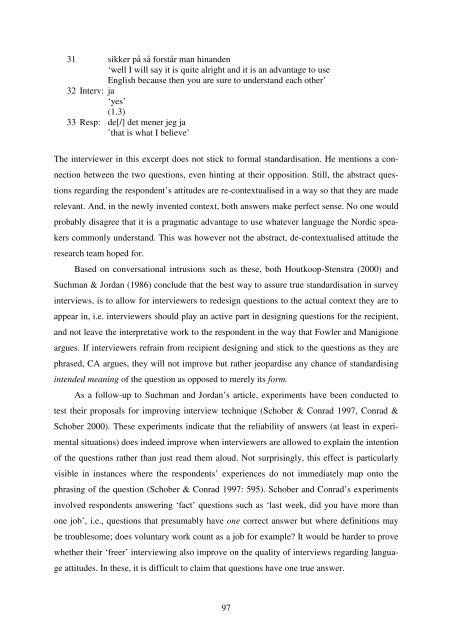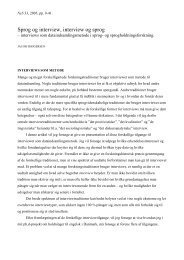Hør dog hvad de siger - Note-to-Self: Trials & Errors
Hør dog hvad de siger - Note-to-Self: Trials & Errors
Hør dog hvad de siger - Note-to-Self: Trials & Errors
You also want an ePaper? Increase the reach of your titles
YUMPU automatically turns print PDFs into web optimized ePapers that Google loves.
31 sikker på så forstår man hinan<strong>de</strong>n<br />
‘well I will say it is quite alright and it is an advantage <strong>to</strong> use<br />
English because then you are sure <strong>to</strong> un<strong>de</strong>rstand each other’<br />
32 Interv: ja<br />
‘yes’<br />
(1.3)<br />
33 Resp: <strong>de</strong>[/] <strong>de</strong>t mener jeg ja<br />
’that is what I believe’<br />
The interviewer in this excerpt does not stick <strong>to</strong> formal standardisation. He mentions a con-<br />
nection between the two questions, even hinting at their opposition. Still, the abstract ques-<br />
tions regarding the respon<strong>de</strong>nt’s attitu<strong>de</strong>s are re-contextualised in a way so that they are ma<strong>de</strong><br />
relevant. And, in the newly invented context, both answers make perfect sense. No one would<br />
probably disagree that it is a pragmatic advantage <strong>to</strong> use whatever language the Nordic spea-<br />
kers commonly un<strong>de</strong>rstand. This was however not the abstract, <strong>de</strong>-contextualised attitu<strong>de</strong> the<br />
research team hoped for.<br />
Based on conversational intrusions such as these, both Houtkoop-Stenstra (2000) and<br />
Suchman & Jordan (1986) conclu<strong>de</strong> that the best way <strong>to</strong> assure true standardisation in survey<br />
interviews, is <strong>to</strong> allow for interviewers <strong>to</strong> re<strong>de</strong>sign questions <strong>to</strong> the actual context they are <strong>to</strong><br />
appear in, i.e. interviewers should play an active part in <strong>de</strong>signing questions for the recipient,<br />
and not leave the interpretative work <strong>to</strong> the respon<strong>de</strong>nt in the way that Fowler and Manigione<br />
argues. If interviewers refrain from recipient <strong>de</strong>signing and stick <strong>to</strong> the questions as they are<br />
phrased, CA argues, they will not improve but rather jeopardise any chance of standardising<br />
inten<strong>de</strong>d meaning of the question as opposed <strong>to</strong> merely its form.<br />
As a follow-up <strong>to</strong> Suchman and Jordan’s article, experiments have been conducted <strong>to</strong><br />
test their proposals for improving interview technique (Schober & Conrad 1997, Conrad &<br />
Schober 2000). These experiments indicate that the reliability of answers (at least in experi-<br />
mental situations) does in<strong>de</strong>ed improve when interviewers are allowed <strong>to</strong> explain the intention<br />
of the questions rather than just read them aloud. Not surprisingly, this effect is particularly<br />
visible in instances where the respon<strong>de</strong>nts’ experiences do not immediately map on<strong>to</strong> the<br />
phrasing of the question (Schober & Conrad 1997: 595). Schober and Conrad’s experiments<br />
involved respon<strong>de</strong>nts answering ‘fact’ questions such as ‘last week, did you have more than<br />
one job’, i.e., questions that presumably have one correct answer but where <strong>de</strong>finitions may<br />
be troublesome; does voluntary work count as a job for example? It would be har<strong>de</strong>r <strong>to</strong> prove<br />
whether their ‘freer’ interviewing also improve on the quality of interviews regarding langua-<br />
ge attitu<strong>de</strong>s. In these, it is difficult <strong>to</strong> claim that questions have one true answer.<br />
97



